By Hamza Suleiman
Gov. Babagana Zulum of Borno has reaffirmed his administration’s commitment to eliminating open defecation practices across the state.
Zulum made the pledge during the inauguration of the state’s roadmap to eliminate open defecation in Maiduguri on Tuesday.
The campaign, aligned with SDG six to ensure water and sanitation for all by 2030, aims to mobilise communities to end open defecation.
Represented by Deputy Governor Dr Usman Kadafur, the governor stated the role sanitation plays in health, education, economic growth, and community wellbeing.
He acknowledged the state’s challenges, including fiscal constraints, but underscored his administration’s commitment to improving Water, Sanitation, and Hygiene (WASH) services.
He stated, “Poor hygiene, open defecation, and lack of access to safe water compromise the dignity and health of our people, contributing to child mortality, undernutrition, and educational barriers for girls”.
He also stressed the importance of clean public toilets in markets, motor parks, and other public places, ensuring Borno meets global sanitation targets.
The governor presented a detailed action plan to achieve these goals, including expanding access to safe water within 30 metres of every household using durable, community-managed systems.
He directed state officials to work with the private sector to develop affordable toilets and introduce interest-free sanitation credits for households and toilet businesses.
 He called for public-private partnerships to sustain WASH access in schools, health centres, and public places, and urged the Ministry of Information to collaborate with the First Lady’s office and media outlets.
He called for public-private partnerships to sustain WASH access in schools, health centres, and public places, and urged the Ministry of Information to collaborate with the First Lady’s office and media outlets.
This, he said is to mobilise communities and promote sanitation and hygiene practices.
The governor appealed to all stakeholders, including traditional leaders, community members, and the private sector, to support the campaign and help make Borno an open defecation-free state.
“A clean Borno State means a prosperous people. Together, we can leave a legacy of dignity and health for future generations,” he said.
Cristian Munduate, UNICEF’s Representative in Nigeria, reiterated the agency’s commitment to supporting the Borno government in eradicating open defecation and improving access to WASH facilities.
Represented by Phuong Nguyen, UNICEF’s Chief of Borno Field Office, she revealed the wide-ranging impacts of open defecation on public health, education, and economic productivity, particularly for children.
She noted that while providing toilets and water infrastructure is vital, fostering behavioral change is equally important.
“It’s not enough to have toilets or water; people must understand their significance.
“Open defecation and poor hygiene lead to severe health issues like diarrhea and malnutrition, which stunt children’s growth and hinder their learning,” she said.
 She further noted that open defecation disproportionately affects girls, as inadequate sanitation facilities often prevent them from attending school during their menstrual periods.
She further noted that open defecation disproportionately affects girls, as inadequate sanitation facilities often prevent them from attending school during their menstrual periods.
“Adults are also impacted, with illnesses like diarrhea leading to absenteeism from work and reduced productivity”.
Munduate stressed the importance of government leadership in this journey, stating, “Each success story in eradicating open defecation begins at the top.
“Borno State has demonstrated this leadership, and we believe that by this time next year, most areas of Borno, if not the entire state, will be free from open defecation.
“UNICEF also calls on traditional leaders, estate owners, and communities to play their part in driving the necessary behavioral changes”.
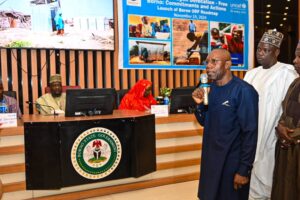 Mr Ajose Adeyemi, Deputy Director of Rural Sanitation, Federal Ministry of Water Resources and Sanitation, congratulated the state for achieving Open Defecation Free (ODF) status in Biu and Shani local governments.
Mr Ajose Adeyemi, Deputy Director of Rural Sanitation, Federal Ministry of Water Resources and Sanitation, congratulated the state for achieving Open Defecation Free (ODF) status in Biu and Shani local governments.
He reaffirmed the federal government’s commitment to supporting the state’s continued efforts and presented the ODF Certificate, Flag, and Plaque to the Deputy Governor.
Earlier, Mr Abu Godwin, a representative of the Clean Nigeria Campaign Secretariat, outlined the strategic objectives and key expectations of the secretariat for the state.
He highlighted goals such as mobilising support at the political, private sector, and development partner levels, and creating a pool of resource persons to support local actors.
Godwin also called for engaging society in adopting safe sanitation practices through behavior change and establishing mechanisms to track progress and share lessons learned.
In his remarks, Sule Ali, Chairman of Biu Local Government Area, praised the National Task Group on Sanitation for recognising Biu as open defecation free.
Ali noted that this achievement would not have been possible without the support of Gov. Babagana Zulum, who had directed the LGA to undertake a sensitisation campaign showing the devastating effects of open defecation.
“By God’s grace, we have succeeded, and today our Local Government is open defecation free,” he said. (NAN) www.nannews.ng
Edited by Tosin Kolade



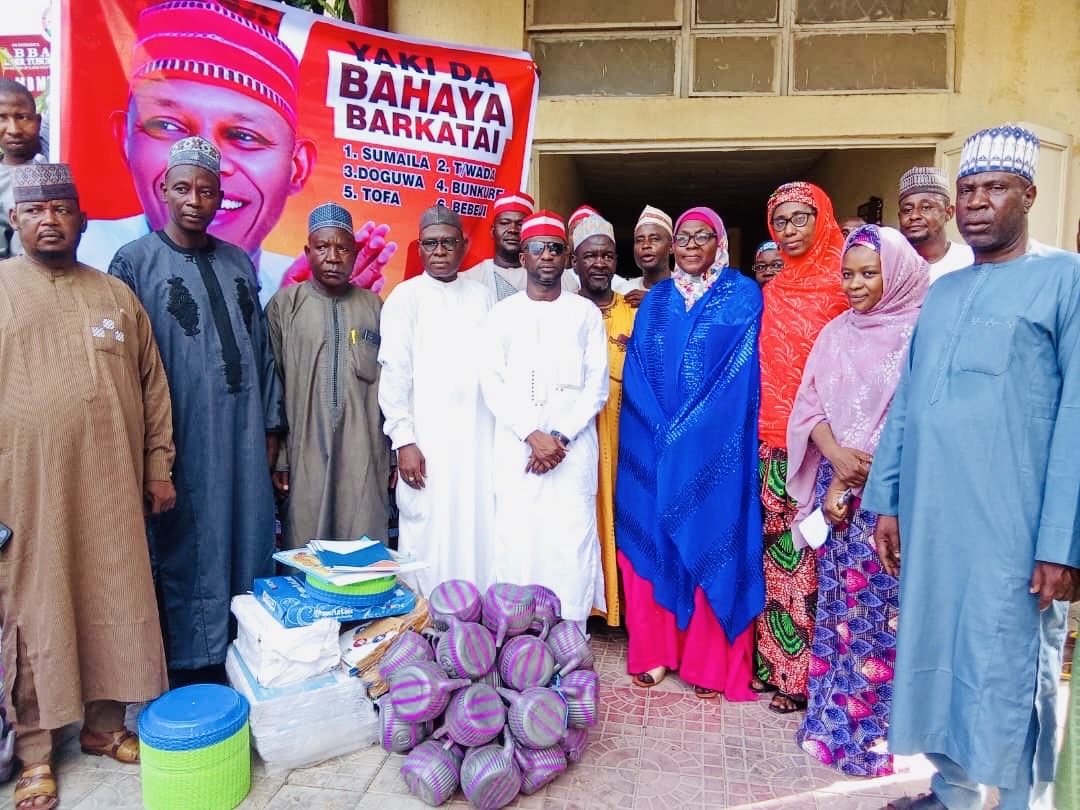

 Ugoh emphasised that the campaign was not only about achieving goals but also about building a passionate community committed to making a positive impact in the sanitation sector.
Ugoh emphasised that the campaign was not only about achieving goals but also about building a passionate community committed to making a positive impact in the sanitation sector.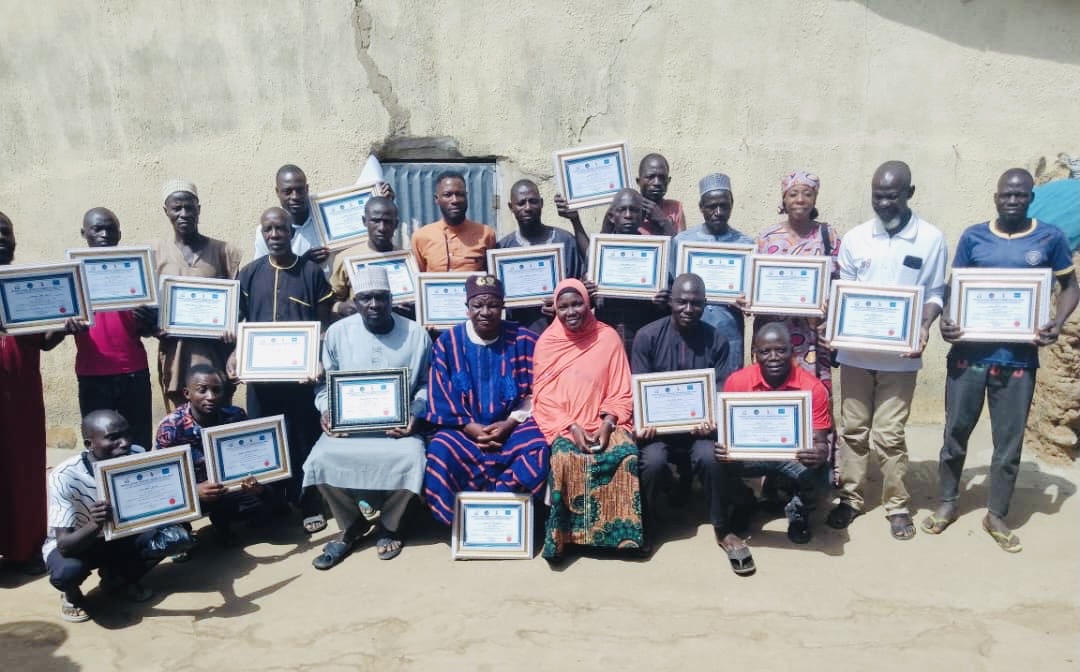
 Mr Sakiru Otusanya, UNICEF’s WASH Consultant, praised the collaboration between RUWASSA and the people of Kwali, urging residents to maintain their progress in sanitation.
Mr Sakiru Otusanya, UNICEF’s WASH Consultant, praised the collaboration between RUWASSA and the people of Kwali, urging residents to maintain their progress in sanitation.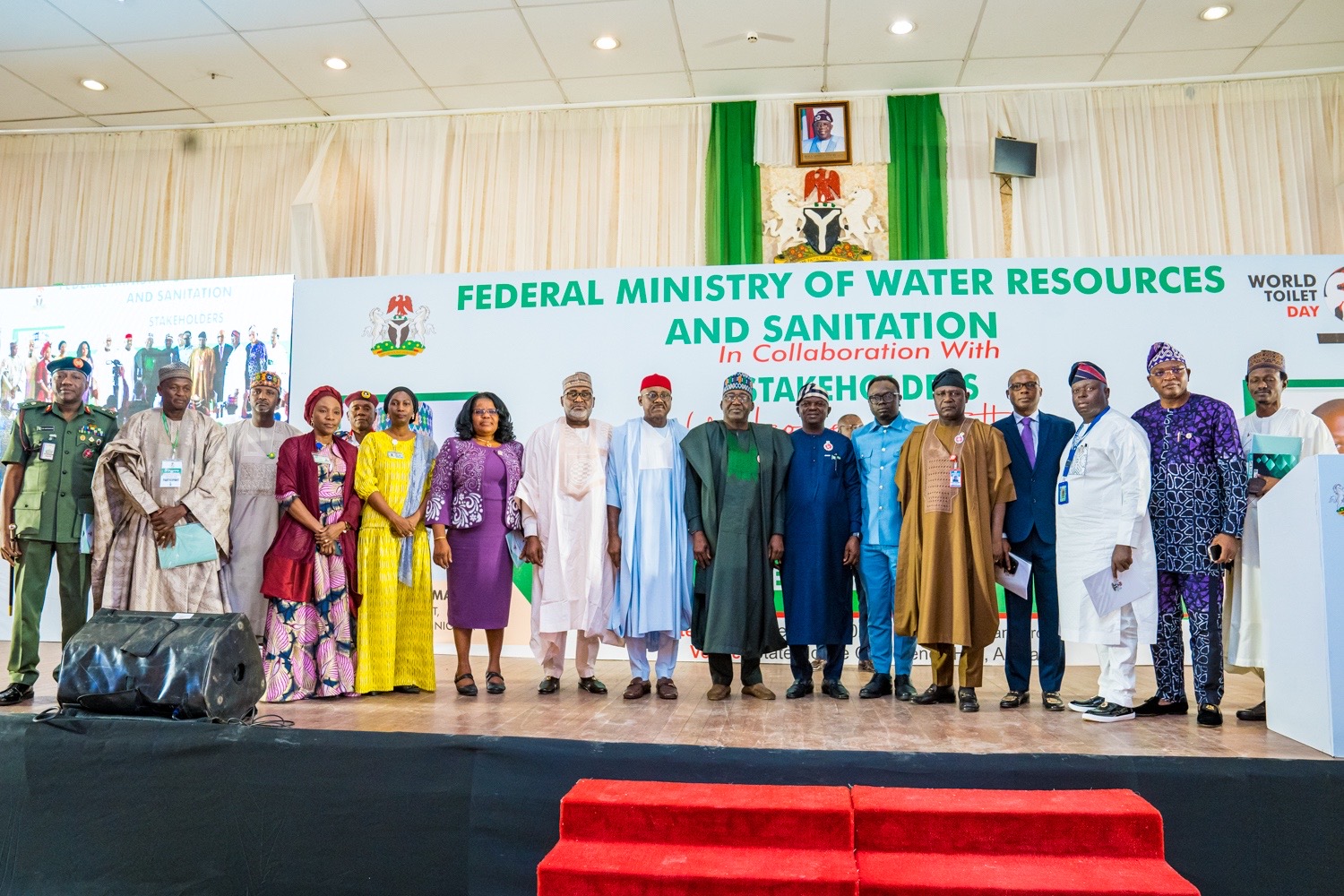
 The Vice-President, therefore, assured that the Tinubu administration was committed to the bid to end open defecation in Nigeria.
The Vice-President, therefore, assured that the Tinubu administration was committed to the bid to end open defecation in Nigeria.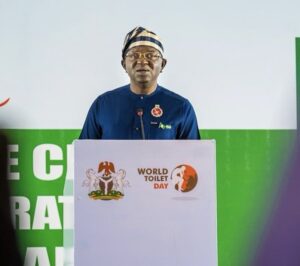 He recalled that the “Clean Nigeria: Use the Toilet” campaign was launched in 2019 under the national programme to end open defecation in Nigeria and is backed by Presidential Executive Order 009.
He recalled that the “Clean Nigeria: Use the Toilet” campaign was launched in 2019 under the national programme to end open defecation in Nigeria and is backed by Presidential Executive Order 009.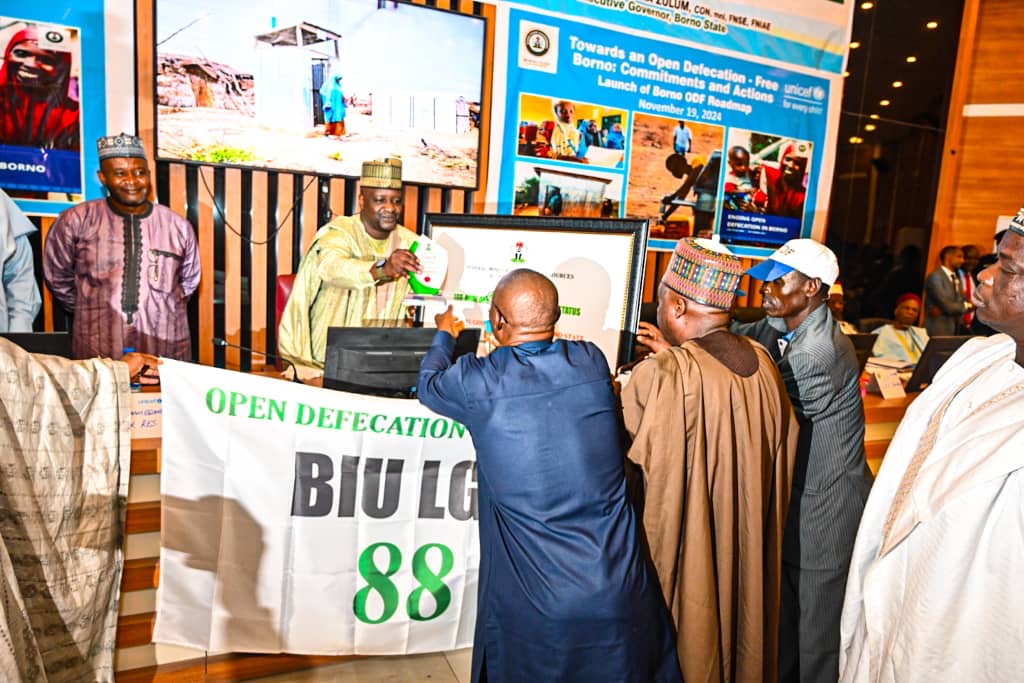
 He called for public-private partnerships to sustain WASH access in schools, health centres, and public places, and urged the Ministry of Information to collaborate with the First Lady’s office and media outlets.
He called for public-private partnerships to sustain WASH access in schools, health centres, and public places, and urged the Ministry of Information to collaborate with the First Lady’s office and media outlets. She further noted that open defecation disproportionately affects girls, as inadequate sanitation facilities often prevent them from attending school during their menstrual periods.
She further noted that open defecation disproportionately affects girls, as inadequate sanitation facilities often prevent them from attending school during their menstrual periods.  Mr Ajose Adeyemi, Deputy Director of Rural Sanitation, Federal Ministry of Water Resources and Sanitation, congratulated the state for achieving Open Defecation Free (ODF) status in Biu and Shani local governments.
Mr Ajose Adeyemi, Deputy Director of Rural Sanitation, Federal Ministry of Water Resources and Sanitation, congratulated the state for achieving Open Defecation Free (ODF) status in Biu and Shani local governments.
 The minister also thanked President Bola Tinubu for his commitment to achieving ODF status in Nigeria.
The minister also thanked President Bola Tinubu for his commitment to achieving ODF status in Nigeria. Utsev called on the media, private sector, and local communities to join the effort to raise awareness and ensure behavioural change at all levels.
Utsev called on the media, private sector, and local communities to join the effort to raise awareness and ensure behavioural change at all levels.